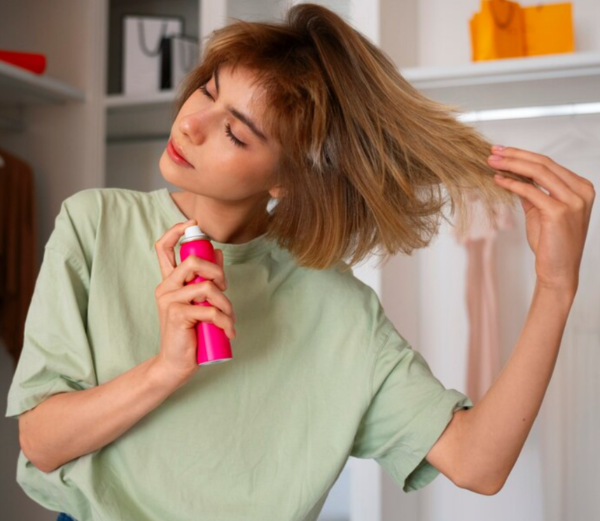Is Rose Water Good For Hair? Rose water, often celebrated for its aromatic and therapeutic qualities, has been a staple in beauty regimens across various cultures for centuries.
While its benefits for the skin are widely recognized, its potential advantages for hair care are equally compelling.
This blog post delves into the properties of rose water, exploring its benefits for hair, how to use it, and what makes it a valuable addition to your hair care routine.
Understanding Rose Water
Rose water is a byproduct of the distillation process used to extract rose oil from rose petals. This fragrant liquid is rich in antioxidants, vitamins, and minerals, which contribute to its therapeutic properties. Key components of rose water include:
- Vitamins A, C, D, E, and B3: Essential for maintaining healthy hair and skin.
- Flavonoids and antioxidants: Help protect hair from damage caused by free radicals.
- Anti-inflammatory and antiseptic properties: Aid in soothing the scalp and reducing irritation.
Benefits of Rose Water for Hair
Hydration and Moisture
- Rose water is an excellent natural hydrator, making it ideal for dry and frizzy hair. Its moisturizing properties help to soften the hair, making it more manageable and reducing frizz.
- Regular use of rose water can help maintain the hair’s natural moisture balance, preventing dryness and brittleness.
Scalp Health
- A healthy scalp is the foundation for strong and healthy hair. Rose water’s anti-inflammatory and antiseptic properties can help soothe an irritated scalp, reduce dandruff, and maintain scalp health.
- It can also help in reducing the symptoms of conditions like eczema and psoriasis.
Hair Growth
- While rose water itself does not directly promote hair growth, it creates an optimal environment for hair growth by keeping the scalp healthy and hydrated.
- A well-hydrated and balanced scalp can help stimulate the hair follicles, potentially leading to improved hair growth.
Strength and Shine
- The vitamins and antioxidants in rose water can help strengthen hair strands, reducing breakage and split ends.
- Regular application of rose water can add a natural shine to the hair, making it look healthier and more vibrant.
pH Balance
- Maintaining the natural pH balance of the scalp is crucial for healthy hair. Rose water has a pH level similar to that of the scalp, which helps restore its natural balance.
- This can help reduce issues like excess oil production or dryness, leading to healthier hair overall.
How to Use Rose Water for Hair
Incorporating rose water into your hair care routine is simple and can be done in various ways. Here are some effective methods to use rose water for hair:
Rose Water Rinse
- A rose water rinse can be a refreshing addition to your hair care regimen. After shampooing and conditioning, pour rose water over your hair as a final rinse.
- This will leave your hair smelling delightful and feeling soft and hydrated. To make the rinse, mix equal parts of rose water and distilled water.
Scalp Treatment
- To soothe an irritated scalp, apply rose water directly to the scalp using a cotton ball or spray bottle.
- Gently massage it into the scalp and leave it on for about 20-30 minutes before rinsing with lukewarm water. This can help reduce dandruff and promote a healthy scalp.
Leave-in Conditioner
- Rose water can be used as a leave-in conditioner to detangle and moisturize the hair. Mix rose water with a few drops of your favorite essential oil (like lavender or rosemary) in a spray bottle.
- Spritz it onto damp hair and comb through to distribute evenly. This will leave your hair soft, manageable, and lightly scented.
Hair Mask
- Incorporate rose water into your hair mask for added hydration and nourishment. Mix rose water with ingredients like coconut oil, aloe vera gel, or honey to create a hydrating hair mask.
- Apply the mask to your hair and scalp, leave it on for 30-60 minutes, and then rinse thoroughly. This treatment can help repair and strengthen damaged hair.
Daily Mist
- For a quick refresh and to keep your hair smelling lovely throughout the day, you can use rose water as a daily mist.
- Fill a spray bottle with rose water and lightly mist your hair whenever it feels dry or needs a boost of freshness.
DIY Rose Water Recipes for Hair
Creating your own rose water at home is easy and ensures that you have a pure, chemical-free product. Here’s a simple recipe to make rose water at home:
Ingredients
- Fresh rose petals (preferably organic)
- Distilled water
Instructions
- Prepare the Roses: Remove the petals from the roses and rinse them thoroughly to remove any dirt or pesticides.
- Simmer the Petals: Place the rose petals in a large pot and add enough distilled water to just cover them. Too much water will dilute the rose water.
- Heat the Water: Cover the pot and bring the water to a simmer over low heat. Do not let it come to a boil as it can destroy the beneficial properties of the petals.
- Extract the Essence: Allow the petals to simmer until they lose their color and the water takes on the color and fragrance of the roses (about 20-30 minutes).
- Strain and Store: Strain the liquid into a glass jar using a fine mesh strainer or cheesecloth. Allow the rose water to cool before sealing the jar. Store in the refrigerator for up to a week.
Choosing the Right Rose Water
If you prefer to buy rose water instead of making it at home, it’s important to choose a high-quality product to ensure you get the maximum benefits for your hair. Here are some tips for selecting the best rose water:
- Check the Ingredients: Look for rose water that contains only pure rose water or rose water and distilled water. Avoid products with added preservatives, artificial fragrances, or other chemicals.
- Look for Organic: Organic rose water is made from roses that are grown without the use of pesticides or synthetic fertilizers, making it a safer and more natural option.
- Packaging: Rose water is best stored in dark glass bottles to protect it from light, which can degrade its quality over time. Avoid plastic bottles as they can leach chemicals into the rose water.
- Reputation: Choose brands that are known for their quality and have positive reviews from customers.
Potential Side Effects and Precautions
While rose water is generally safe for most people, it’s important to be aware of potential side effects and take precautions to avoid adverse reactions:
- Allergic Reactions: Some people may be allergic to rose water. Before using it on your hair and scalp, do a patch test by applying a small amount to the inside of your wrist or elbow. If you experience any redness, itching, or irritation, avoid using it.
- Avoid Contamination: Always use clean hands or tools when handling rose water to prevent contamination. Store it in a cool, dark place or in the refrigerator to extend its shelf life.
- Dilution: Pure rose water can be quite potent. If you have sensitive skin or scalp, consider diluting it with distilled water before use to reduce the risk of irritation.
Conclusion
Rose water is a versatile and beneficial addition to any hair care routine. Its hydrating, soothing, and nourishing properties make it an excellent natural remedy for dry, frizzy hair and an irritated scalp.
Whether you choose to make your own rose water or purchase a high-quality product, incorporating this fragrant floral water into your hair care regimen can lead to healthier, shinier, and more manageable hair.
Remember to choose pure, organic rose water and perform a patch test to ensure you enjoy all the benefits without any adverse reactions.
With regular use, rose water can become a cherished part of your hair care routine, offering a touch of luxury and natural beauty.

